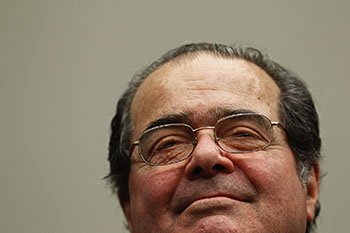 With the death of Antonin Gregory Scalia, the nation has lost one of its greatest jurists and a man who embodied the principle of fidelity to the Constitution. Requiescat in pace. –Prof. Robert P. George
With the death of Antonin Gregory Scalia, the nation has lost one of its greatest jurists and a man who embodied the principle of fidelity to the Constitution. Requiescat in pace. –Prof. Robert P. George
In the field of public service, exceptional leadership is hard to come by. A public figure that is willing to be considered a “fool” for Christ is even less common. Yet, for the past two decades, we have had the rare privilege of Justice Antonin Scalia serving as a member of the Supreme Court, a man who exemplified what it means to be highly engaged in issues facing American society and consistently and unapologetically Christian.
Although his death has rocked the country, his life left an indelible mark on history that will continue to serve as a guide. Robert P. George, the brilliant McCormick Professor of Jurisprudence at Princeton, penned an appropriately touching description of Justice Scalia that was published by The Public Discourse. From his service to the American people to his personal connections with those who often held opposing views, Justice Antonin Scalia epitomized the characteristics of an exemplary Christian leader, as Prof. George eloquently describes:
Over the course of our nation’s history, many jurists have been described as “towering figures in the law.” Antonin Scalia had the distinction of being one of the handful for whom the description is actually justified.
Justice Scalia preached the principle that the Constitution should be interpreted in a way that honors the text—the words on the page—understood as it was by those whose ratification made it part of the fundamental law of the land. One might have thought this was simple common sense. But the principle had been ignored or abandoned by jurists and law professors who sought to expand the authority of judges to invalidate as “unconstitutional” legislation or executive actions that they happen to regard as unfair, unwise, or for some other reason undesirable.
No matter the area of his life you study, Justice Scalia was unrelenting in his beliefs, never acting against his conscience, yet he was also never tyrannical or overtly aggressive. He let his brilliance and faith guide and aide him:
As a jurist, Antonin Scalia was known for his tough questioning of lawyers appearing before the Court, and for his brilliant, colorful, often combative opinions—many of which took the form of dissents. In addition to his determined advocacy of originalism, he will be remembered for his devotion to the constitutional principle of the separation of powers and his efforts to restore federalism—despite his belief that the progressive-era constitutional amendment providing for the direct election of Senators made the task hopeless. (“Federalism is dead,” he told me and our audience at the Union League. “The Seventeenth Amendment killed it. It’s dead, dead, dead.”)
What was Nino Scalia like as a person? He was a man of limited patience and great compassion. To say that he “did not suffer fools gladly” would be an understatement. He had no tolerance for slouchers, slackers, rent-seekers, time-servers, or free riders, and he wouldn’t bend the law for anybody—even if he personally believed the law too harsh. But as his friends of all political persuasions unanimously attest, he was capable of great kindness and generosity. He was a limited-government man, both as a matter of political philosophy and constitutional law, but he deeply believed in personal responsibility, including the duty of charity to those who are suffering or in need.
A devout Catholic, Scalia neither hid nor flaunted his faith. When asked about his beliefs, he spoke of his Christian commitments with no hint of embarrassment. He was not ashamed of the Gospel. In a widely publicized speech, he reminded his fellow Christians of the teachings of St. Paul, urging them to “have the courage to have your wisdom be regarded as stupidity: Be fools for Christ.”
As a teacher, Scalia instilled in his students a deep admiration and loyalty. As Sherif Girgis, a close friend of Robby George, insightfully described:
Justice Scalia boldly professed things that many of his secular, liberal academic colleagues thought simpleminded and naïve—originalism, patriotism, faith in God. The brilliance and sheer joie de vivre that oozed from his writing and filled the room when he spoke made his ideals attractive to the young (often via the shadow law curriculum of his dissents), and challenged adversaries to engage him in intellectual combat.
And in his personal life, Justice Scalia was just as impressive:
One of Antonin Scalia’s most remarkable qualities was his gift for friendship—a gift that enabled him to form deep and lasting bonds of affection despite religious, moral, or political differences. His closest friend on the Supreme Court was the stalwart liberal Ruth Bader Ginsburg (with whom he had also served on the U.S. Court of Appeals for the DC Circuit). He also befriended his younger, hipper liberal colleague, Elena Kagan, sometimes dragging her off with him on hunting trips. Justice Kagan’s staunch progressivism and firm rejection of originalism did not diminish his affection or respect for her in the slightest.
Nino Scalia was a faithful and loving husband to Maureen, his brilliant, Radcliffe-educated wife of fifty-five years, and a wonderful father to their nine children.
Justice Antonin Scalia served his country and adhered to his faith with an integrity to be admired, and his intellectual genius will not soon be forgotten. While he is sorely missed by a nation, we can appreciate what he contributed to American society, especially for showing the world how to be faithful to Christ in the public sphere. May he rest in peace.



